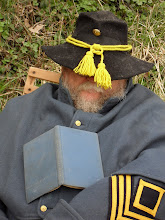Lies, Damn Lies, and Oral History?
I've been doing history for a short while (when you tend to think in millennia, half a century is chump-change) and the more I do it, the more I get the feeling we're being kidded sometimes.
One of the big deals at the moment is "oral history." This usually seems to involve a senior high school student or college undergrad pestering old farts for the story of how things were when said old fart was about their age. Nothing wrong with this. It keeps the kids out of beer joints and gives the ancients a visitor and something to pass the time. The only problem is when the history that comes from this source is distributed as the GOSPEL TRUTH without being checked against reality (whatever that is).
I realize there are those who maintain all truth is relative. As a certain Roman bureaucrat asked a little while ago, "What is truth?" My opinion only, but I'm inclined to believe TRUTH exists in a single form. It is the interpretation each of us puts on the phenomena that we witness that varies. The story about the six blind men and the elephant is all too true.
The basic failure mode is that people with little experience of life are depending on a bunch of folks who can't remember what they had for breakfast for information as to happenings fifty to sixty years back. Being in that class, I am aware that some things experienced half a century ago can be crystal clear in hindsight. I must admit, though, in my own case, the clear chunks are disjointed in time. Some things stay with you for better or worse (the first deer you killed or the first man). These memories are hard and sharp, sometimes jumping out at you like a jack-in-the-box when you least expect it. But, most of the time, the things between are a blur. Most of life just isn't that interesting and the mind tends to dump such memories. Try this, think way back to yesterday morning when you were driving. Call up the memory and replay it looking at the details. Yeah, what details? For most people they aren't there--you may remember leaving your home and possibly your arrival at your destination but most of the trip (with the exception of the idiot cutting you off as you were cutting him off) most likely isn't there. Women tend to maintain their memories are better than men's of things of years gone by. Possibly this is true--equally possible is that the gentlemen involved don't look forward to a night of torture on that rack known as the couch. The song, "Yes, I remember it well," from Gigi pokes fun at this.
Cops know the longer between the incident and the interview, the more garbage shows up in the statement. And this is with witnesses who want to help. When looking at witness statements, often the best they can do is seek a quorum. Everybody saw something different or remembers it differently and are telling the truth as they know it. Akira Kurosawa explores this in his movie, "Rashomon," with it's story of a crime seen from four different people's perspectives. The investigators usually end up going with the details most appear to agree on and what in the officers' experience seems likely.
The reliability of oral history tends to be uneven. Some things related are close to fact while others launch into fiction. Cross-checking is necessary to back up an account. This requires other witnesses and documentation. Then it has to be run through the researcher's B.S. detector--does it add up? B.S. detectors become better with life experience. They can also fail unexpectedly. As an example, a retired Marine Raider officer once mentioned to me that the Raiders had British Commonwealth made Boys 55 mm antitank rifles at Guadalcanal. Huh? U.S. Marines equipped with Brit antitank weapons?! Happily, I treated the situation as I do most with my fellow humans--just nod, keep smiling, and make sure your escape route is clear. A couple of months later, I'm deep into research and what do I find referenced in two different places backed up by a photograph? Yeah, you guessed it--Raiders carrying Boys guns on Guadalcanal.
If you're using oral histories in your research, be sure to cross-check them. They can be a gold mine or the county dump.
29 January 2010: Feast of St. Aquilinus of Bavaria. "The Raven" by Edgar Allan Poe is published 1845, American League founded in Philadelphia 1900, USS Missouri (BB 63) commissioned 1944, Hungary recognizes South Korea - first in Warsaw Pact 1989.
Subscribe to:
Post Comments (Atom)




No comments:
Post a Comment